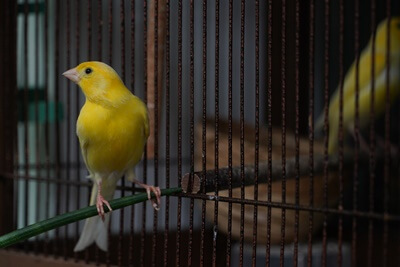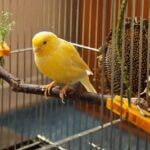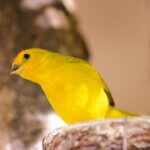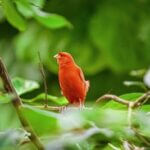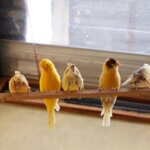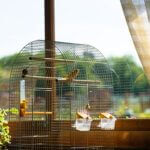Like most small birds, canaries poop every 15-20 minutes. The high frequency of defecation in canaries is attributed to their rapid metabolism, characterized by a fast-paced digestive system.
Younger canaries, in particular, poop more frequently than older canaries because their digestive systems work even faster, and younger birds are smaller in size.
Canary poop color, odor, consistency, size, and frequency can tell us a lot about its state of health. So, we’ll examine what a healthy canary’s poop should look like and how to tell whether your canary is sick by examining the different features of its droppings.
What Does Normal Canary Poop Look Like?
Ensuring that poop looks natural and healthy confirms that a canary feels good. Unhealthy droppings allow you to react to difficult-to-detect illnesses before they become more serious.
When examining canary poop, here are the different factors to consider:
Color
The color of a bird’s poop depends largely on its diet. Canaries eat various seeds, such as hempseed, flaxseed, rapeseed, and fresh fruits and vegetables.
Consequently, the different colors of these foods mix to form poop with a wide range of colors.
A healthy canary’s stool should be green or brown. If the color inexplicably deviates from what you’re used to seeing, it may indicate an underlying health issue.
Certain fruits, such as blueberries and cherries, will significantly alter the color of canary poop. So, account for the last meal it ate, as the food’s prominent color will be reflected in its most recent poop.
Below is a table with different colors that canary’s poop might display and what they mean:
| Poop Color | Meaning |
| Dark brown or Green: | This is the normal color of a canary’s poop. |
| White: | Although it’s normal for a canary’s poop to contain urates (which are white), excess urates might indicate a kidney problem. |
| Red or Rusty Brown: | A red color indicates the presence of blood, signifying internal bleeding. |
| Yellow: | Yellow poop can be a warning of anorexia or chlamydiosis. |
Odor
Canary droppings usually have little or no smell. Therefore, if you notice a foul smell coming from your canary’s poop, it might have a gastrointestinal problem, illness, or infection.
Of course, you shouldn’t sniff your canary’s poop, as pathogens in bird droppings can be transmitted through the air. For instance, Central Bacteria found that canary droppings harbor cryptococcus neoformans, a type of yeast that causes infection in humans when inhaled.
Pay close attention to any unusual scents from your canary’s cage once it defecates. If you notice any strong or unusual odors, it’s worth having your pet examined by a specialized avian vet.
Consistency
To gauge your canary’s poop, you should understand what a healthy consistency looks like.
Canaries don’t have separate processes for excreting urine and feces. Instead, they expel these wastes through their anal vent. So, canary droppings aren’t usually hard.
Urine makes up about 30-50% of the total volume of a canary’s droppings. Moreover, the urine is unclear, as is the case with mammals. Instead, it has a pasty consistency. Canary urine is essentially a mix of urates (which are thick and white) and liquid urine (which is clear).
Although the amount of urine in a canary’s poop can vary slightly, if there’s too much or too little urine in its droppings persistently, it’s cause for concern.
Size and Amount
The volume of a canary’s droppings varies based on the size of the bird. Larger canaries produce larger droppings than juvenile canaries, and their poop is much greater.
Of course, the volume and frequency of pooping might vary slightly, depending on the canary’s diet. However, drastic changes in these factors might indicate a health problem.
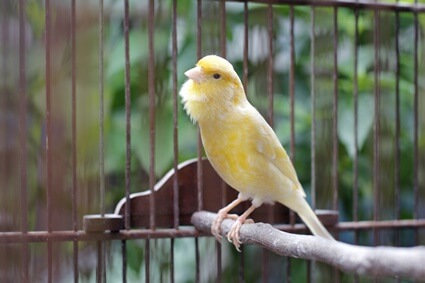
What Causes Abnormal Poop In Canaries?
Many factors contribute to abnormal droppings in canaries, so it’s difficult to narrow down the culprit simply by looking at your bird’s poop. Common causes of abnormal droppings include:
Diet
The type of diet a canary eats affects the color of its droppings. Because canaries subsist on seeds, pellets, and fresh vegetables, their droppings will reflect the color and texture of these foods.
For example, canaries primarily given fruits and vegetables will have softer stools. Meanwhile, those that mainly consume seeds and grains will produce firmer droppings.
Constipation
Although constipation is rare in canaries, it’s possible if they don’t get enough fiber in their diet.
A constipated canary has difficulty pooping, and even when it does poop, the droppings will be firm and devoid of liquids.
In addition to producing abnormal droppings, a constipated canary can manifest these symptoms:
- Loss of appetite
- Fluffed feathers
- Drooping wings
- Lethargy
- Irritability
Fortunately, constipation in canaries can be treated at home with olive oil. Hold your canary with its backside facing up, and pour 2-3 drops of olive oil inside the anal opening. Allow the liquid to flow upwards, where it can ease the symptoms.
Intestinal Parasites
Canaries are prone to gastrointestinal parasites, including threadworms, pinworms, and tapeworms, damaging their digestive tract and transmitting illnesses.
A canary might experience intestinal bleeding, which manifests as the presence of blood in the stool.
Illnesses and Infections
According to Experimental and Applied Acarology, canaries are susceptible to chlamydiosis, which is spread through the air. Canaries with this condition manifest a wide range of symptoms, including:
- Lack of appetite
- Diarrhea
- Dark green droppings
If not treated early, this illness can lead to more severe problems, including:
- Mobility issues
- Drastic weight loss
- Sudden death
More commonly, unhealthy poop in canaries may indicate kidney disease. The kidneys are responsible for eliminating digestive waste from the bloodstream, and this waste is subsequently expelled from the canary’s body in the form of its droppings.
If your canary’s kidneys aren’t functioning properly, its ability to retain water will be compromised, causing them to lose water through droppings. As a result, the stool may contain more liquid.
Keeping Your Canary’s Poop Healthy
Be mindful of the food you offer to keep your canary’s poop healthy.
Avoid feeding it dairy products such as milk, yogurt, and cheese, as these contain lactose. Birds can’t digest lactose because they lack the enzyme lactase, so it may cause diarrhea.
Protect your canary from infectious illnesses and parasites that may cause digestive problems. This includes maintaining cage hygiene and preventing direct contact between your canaries and other pets with transmittable health problems.
Canaries mask signs of illness well to avoid appearing vulnerable to predators. Unfortunately, these traits make detecting the early signs of illness difficult, thus delaying diagnosis and treatment.
You can tell a lot about your canary’s health by observing its poop. Monitoring the appearance of your canary’s poop provides important clues about its health status.

